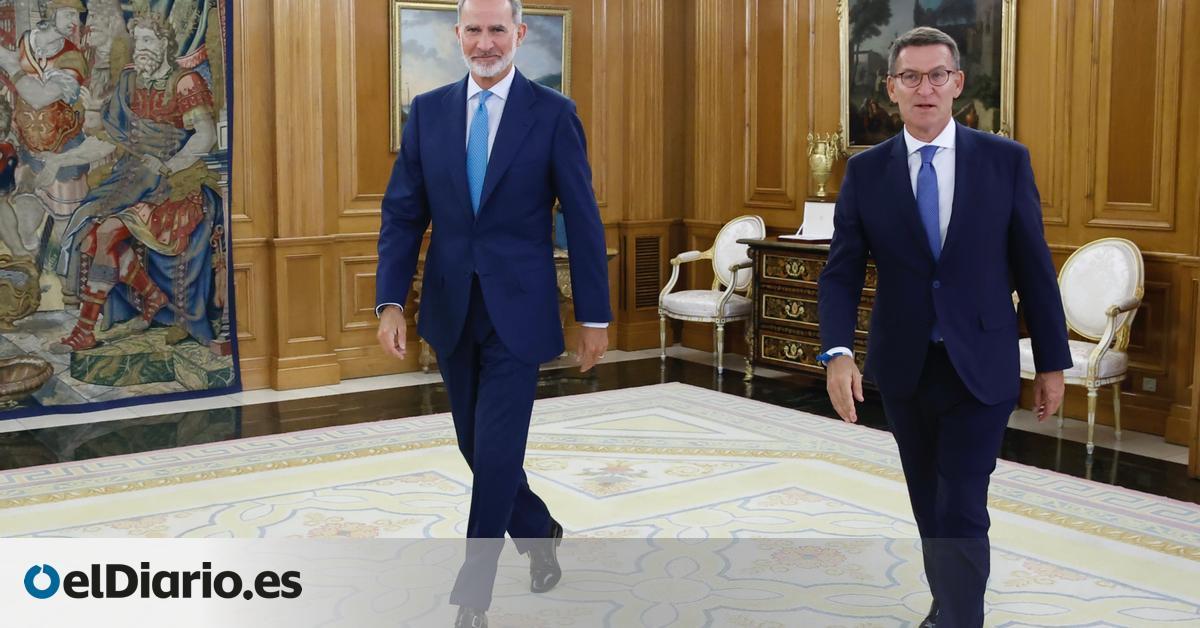
I had never had to choose before. Until now, and although the results of previous elections had shown scenarios of difficult governability or even blockade, the king had limited himself to proposing the candidate who requested it for the investiture. But this time two asked him for it and, therefore, this time was the first time in which his decision had to include a dose of discretion that, given the null viability of his commission to the PP candidate, not everyone shares among the main parliamentary groups. Whisper, there are those who question the decision of Felipe VI in the halls of Congress. Nor is it common in the Lower House.
Feijóo begs Sánchez to let him rule for two years after verifying his lack of support for the investiture
Further
During the round of contacts, Pedro Sánchez and Alberto Núñez Feijóo personally conveyed to the monarch their intention to undergo an investiture session. Sánchez, based on the possibility of obtaining sufficient support; Feijóo, with the argument of having been the most voted on 23J. But the reality is that neither of them, at the time they went to the Palacio de la Zarzuela, could certify to the king that they had the necessary support.
There were leaders those days in some of the main political parties who saw only one possible way out of this convoluted situation that did not compromise the neutrality of the figure of the head of state: that once it was verified that neither of the two candidates with the intention of trying could guarantee support, Felipe VI postponed his decision and gave time to negotiations that, perhaps, would already shed some light before a second round of contacts.
There are those who came to believe it even in those closest to the President of the Government, from where they have always striven, in public and in private, to put absolute respect for the decision of Felipe VI, which they have combined with their criticism of ” paripé” of the investiture of Feijóo.
Those who thought so supported their reasoning in the first vote of the legislature in Congress. Just five days before Sánchez and Feijóo visited the king, the result of the election for the presidency of the Table was forceful: the PSOE obtained 178 supports, two above the absolute majority, while the PP reaped a very heavy defeat, after not even getting the support of Vox, his strategic ally, and having only 139 votes after adding to his own only the seat of the Canary Islands Coalition and that of UPN.
The fracture of the block on the right was a personal blow to Feijóo’s aspirations. After insisting since 23J on his right to attempt the investiture and even to govern for having come first in the elections, his legitimacy to stand before the king and ask him to be a candidate with the fiasco under the arm of the vote in Congress and without power Even ensuring the support of his Vox partners was more than in question.
That was exactly the scenario in which several leading figures in Spanish politics concluded that Felipe VI could not entrust the PP leader with the investiture. Meanwhile, Feijóo and his spokespersons tried to minimize the importance of the table’s voting score and pressed with statements in which they took Zarzuela’s commission for granted.
But then, and in record time, something changed. Without anything happening, in the eyes of the public and the media, the general secretary of Vox, Ignacio Garriga, was quick to clarify in an interview on Telecinco that his party kept its hand “outstretched” to the PP for an investiture . Barely 24 hours had passed after the vote in Congress during the constitution of the Cortes and Feijóo, almost by magic, was once again able to boast 172 supports on the eve of his appointment in Zarzuela.
On the morning of August 22, Santiago Abascal and the leader of the PP had a telephone conversation after which the leader of the extreme right confirmed to Felipe VI that despite the fact that his partners in so many institutions had politically humiliated Vox by preventing them from having representatives At the Congress Table, the far-right formation would support the PP candidate. Abascal himself recounted it this way in a later statement to the press in which, breaking his custom, he did not admit questions. He justified it like this: “To be absolutely precise in what he wanted to say.”
Vox’s turn and a little-rooted “custom”
The Constitution grants a relevant role to the Head of State in the investiture procedure of the President of the Government but leaves some gaps. His role is briefly defined in article 99, which is limited to stating that the king “will propose a candidate for the presidency of the Government (…) after consulting the representatives designated by the political groups with parliamentary representation.” Nothing else. Nor does it specify what to do when no candidate is running, as happened in 2016, when Mariano Rajoy refused to go to a vote that he knew he was going to lose; nor when none of those who have applied have guaranteed sufficient support, as is currently the case.
The monarch decided on this occasion to activate the counter for a possible electoral repetition by proposing Feijóo for an investiture doomed to failure, as he warned of his difficulty in obtaining support beyond the extreme right of Vox and propped up the progressive majority achieved for the aforementioned voting on the constitution of the Table and the presidency of the Congress. To endorse his proposal, Felipe VI relied on a new argument: the “custom”.
In his statement, he pointed out that, except in the short legislature of 2016, the head of state has always nominated the candidate with the most votes first. In addition, he justified his decision that, “to date”, “the existence of a sufficient majority for the investiture” had not been verified, which, in his case, would cause that “custom” to decline. This argument evokes the theses of the PP, whose leader has been insisting for weeks that the candidate from the most voted list should reach the presidency of the Government “as has been the custom for the last 45 years.”
They are appeals to a supposed “custom” that, according to Miguel Ángel Presno, professor of Constitutional Law at the University of Oviedo, “lack any constitutional foundation.” This jurist affirms that, according to article 99 of the Constitution, the king is not subject to a customary rule that obliges him to propose as a candidate the head of the list of the party that has won the most seats, but that “he must propose the one who is in a position to obtain the confidence of Congress, regardless of whether it leads the list with the most votes, because the key is that it can obtain, with the support of other groups, the necessary votes in Congress”.
The reality is that neither Feijóo nor Sánchez could certify to the monarch that they had the necessary votes to be invested when they went to the Zarzuela Palace. Given this scenario, Presno Linera considers that Felipe VI was not obliged to propose the candidate of the party with the most seats, but that he could have allowed some time to elapse and hold a new round of consultations “to verify if that or another candidate is in a position to be invested”. It was what he did, for example, in the aforementioned precedent of 2016.
This professor draws attention to the fact that the king’s communiqué implied that this “custom” exists because in almost all the precedents the party with the most votes was proposed as candidate “but it is omitted that on four of those occasions there was an absolute majority of a specific political option —PSOE or PP— and in several more it was known that the proposed candidate had a sufficient majority due to the support of various parliamentary groups”. “In those cases, the king was obliged to propose that candidate, not out of custom but by mandate of article 99. This situation does not currently exist and once we are invoking customs, it must be known that they require that we meet before similar situations,” he adds.
Ana Carmona, professor of Constitutional Law at the University of Seville, gives less importance to the appeal to the “custom” made by the monarch in his statement, which he considers “institutionally correct.” In her opinion, what was really decisive was what came next: the verification that, at least at that moment, none of the applicants had the necessary support. And that, only in this scenario, it is decided to “follow the dynamics” of designating the head of the list of the force with the most seats.
In fact, this jurist considers that the fact that Sánchez was not opposed to his opponent receiving the commission in the first place also contributed to the king’s decision, no matter how much he stressed to the monarch —and also to journalists— that he did not he saw sense in Feijóo submitting to a failed investiture. Carmona insists, in any case, that the king has in this process “an extremely limited margin of action, in which he verifies and corroborates the state of affairs in Congress and who has possibilities for the investiture.”
Several parliamentary spokespersons agree, however, that without Vox’s turn to support the PP despite the break during the vote of the Table, the king would not have been able to make a decision that, in reality, gave rise to an impossible task, such as the PP leader himself would immediately proceed to admit. “It is better to lose an investiture and not for Spain to lose,” he said in an express assumption of defeat five days after Zarzuela’s statement proposing him as a candidate.
Since then, in Genoa they manage to try to fill the agenda of the long month that remains until the investiture session on September 26 with meetings and various events. Appointments, phone calls and even WhatsApp messages to try to simulate negotiations that do not even exist as such due to the slamming of formations such as the PNV. Despite the verification that it is impossible to obtain support, the popular met this Wednesday with Pedro Sánchez in Congress. The socialist candidate and acting president attended and the result was as expected. “I have verified the rejection of the PSOE,” Feijóo said after his one-hour appointment with the leader of the Socialists and acting president and after justifying his staging, as wasteful as it may seem, in “the king’s order.”
The following will be a round with regional presidents without any role in the investiture to which the Socialists have already said they will not attend. Even the lehendakari, Íñigo Urkullu, with whom Feijóo maintains a good personal relationship, has planted him and has redirected the appointment to a “cordial” telephone conversation in which he has once again told the PP not to count on the PNV. And there are still 23 days left for Congress to hold the plenary session of an investiture doomed to failure from the moment Felipe VI commissioned it.
Source: www.eldiario.es

